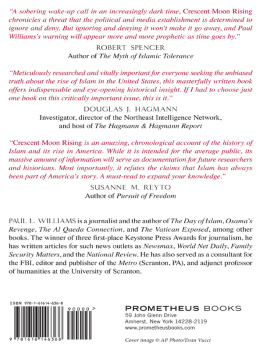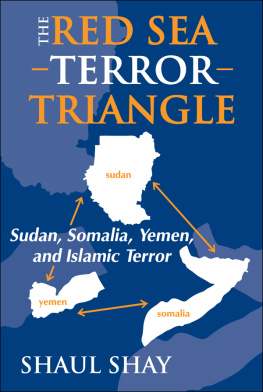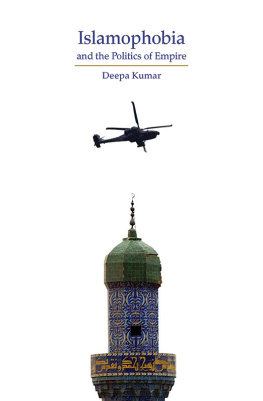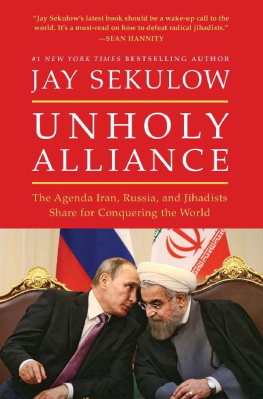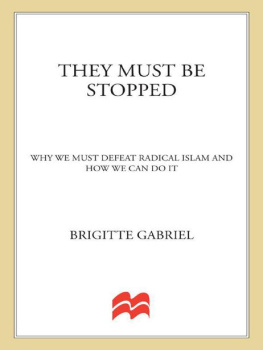The Dark Side of the Crescent Moon
The Dark Side of the Crescent Moon
The Islamization of Europe and Its Impact on American/Russian Relations
Georgy
Gounev
With a new epiloge by the author
First published 2014 by Transaction Publishers
Published 2017 by Routledge
2 Park Square, Milton Park, Abingdon, Oxon OX14 4RN
711 Third Avenue, New York, NY 10017, USA
Routledge is an imprint of the Taylor & Francis Group, an informa business
Copyright 2014 by Taylor & Francis.
All rights reserved. No part of this book may be reprinted or reproduced or utilised in any form or by any electronic, mechanical, or other means, now known or hereafter invented, including photocopying and recording, or in any information storage or retrieval system, without permission in writing from the publishers.
Notice:
Product or corporate names may be trademarks or registered trademarks, and are used only for identification and explanation without intent to infringe.
Library of Congress Catalog Number: 2014009853
Library of Congress Cataloging-in-Publication Data
Gounev, Georgy.
The dark side of the crescent moon: the Islamization of Europe and its impact on American/Russian relations / Georgy Gounev.
pages cm
ISBN 9781-412854061
1. Islamic countriesRelationsEurope. 2. Europe Relations Islamic countries. 3. Islam and world politics. 4. United StatesRelationsRussia. 5. RussiaRelationsUnited States. 6. Islam21st century. I. Title.
DS35.74.E85G68 2015
305.697094dc23
2014009853
ISBN 13: 9781-412854061 (pbk)
This book would not have been published without all the support of my close friend and associate Pat English, who, in addition to her outstanding editing and research services, made possible my traveling to conduct interviews throughout Europe. In recognition of the magnitude of Ms. Englishs contribution, I dedicate this book to her.
This book is dedicated as well to the memory of Mona Mahmudnizhad, an Iranian woman who was brutally tortured. On June 18, 1983, she was hanged, together with nine other women who shared her Bahai faith, in Adelabad prison, located in the city of Shiraz. The appeal for clemency by the president of the United States, Ronald Reagan, was ignored by the Islamo-totalitarians. At the time of her execution, Mona was just eighteen.
Dr. Milcho Lalkov was a chair of the Department of Balkan Studies at the University of Sofia, Bulgaria, and a close friend of mine. He saw the mortal danger for the civilization emanating from radical Islam much earlier than me. His untimely death was a heavy loss for Bulgarian science and culture. The book is also dedicated to the memory of Deniza Grozeva.
Contents
To Hristina, with deep gratitude for her constant support throughout the years.
Introduction
The Sunset of the Cold War and the Dawn of Radical Islam
There are two major challenges that historians and the political observers are encountering. The first one displays the lack of ability of the scholars and politicians to trace the birth and the first steps of some new and extremely important social and political trends. It would be enough to recall the fact that the world missed the first signs of the future triumphs of totalitarianism in its right-wing and left-wing versions. The second equally important failure of those who by trade are supposed to trace at least some of the main dimensions of the future dangers threatening mankind involves the lack of ability to predict either the beginning of the important trends or their end.
As far as the strategy that contributed to the end of communism is concerned, it is obvious that President Reagan realized the combined impact of the two factors as far back as 1982. It would be reasonable to assume that he saw his main task as far as the Afghan War was concerned was to provide all-out American support for the forces of resistance fighting the Soviet invaders. What President Reagan did not know and could not have suspected, together with the rest of the world, was that, as a matter of fact, the United States was rendering support to its future worst enemy.
Radical Islam matured in Afghanistan, but it was not born there. There is some confusion involving the very term radical Islam. To start, the adherents of the extremist ideology would point out that there is no such phenomenon. According to them, there is one and only one true Islam, the purity of which they must defend.
It could be argued that a very important component of the ideology of radical Islam has emerged in the speeches and writings of Sayyid Abul Ala Maududi, who was one of the leading religious thinkers contributing to the Muslim revival on the territory of Colonial India. The main premise of Maududis powerful message that had a tremendous impact over the minds of later generations of Islamic jihadists was his loud and clear proclamation that what mattered to him was not the national liberation of the Muslim countries and nations from the European colonial control. All that mattered to Maududi was the creation of Islamic states that strictly followed each of the requirements of the earliest period of Islamic history. The creation of such states will be only the first phase leading to the second one, the establishment of a Muslim domination over non-Muslim parts of the world. The justification for this ambitious goal has been Maududis firm conviction that Islam is the only religion that acts in keeping with Gods will, and, consequently, the elimination of all other wrong belief systems would be an action supported by God.
The fact that the entire Arab-Muslim world had been colonized by the theocratic Ottoman Empire, which was the only great Muslim (but not Arab) power, brought about a feeling of humiliation and hostility among the Arabs. At the same time, however, from an Arab-Muslim prospective, the dissolution of the Ottoman Empire in the aftermath of World War I meant that the Muslim world had been completely eliminated from any kind of participation in the global political process. It could be argued as well that the failure of the Muslim world to perform the process of modernization under European domination brought about the emergence of a religious-based attempt to establish a global Muslim identity designed to provide Muslims with the feeling of pride and belonging. Later, this concept was enriched with the formulation of a new goal that aimed to establish a model Muslim state much larger than the territories conquered by early Islam in the seventh and eighth centuries. According to contemporary Islamic extremist leaders and their followers, the Islamic theocratic state should include the entire continent of Europe.
The first phase in the development of radical Islam was connected with the creation in 1928 of an organization called the Muslim Brotherhood. Its founder was a religious thinker and charismatic leader by the name of Hassan al-Banna. The influence of the organization extended well beyond the borders of Egypt when the Brotherhood found followers in Syria, British Palestine, and Transjordan.
No author or scholar has failed to mention the Islamic fanaticism that marks the ideology of the Muslim Brotherhood. What remains far less understood is the startling similarity between the modern political Islam and the main concepts of German Nazism. In short, according to the program of the Brotherhood, the entire educational system of the country was to be put under the direct supervision of the Muslim clergy by subjugating the schools to the mosques. Very importantly, all political parties and organizations in Egypt were supposed to be banned as well.


